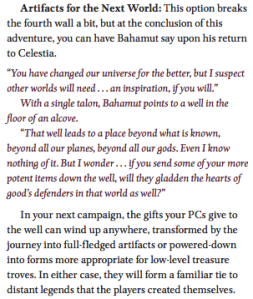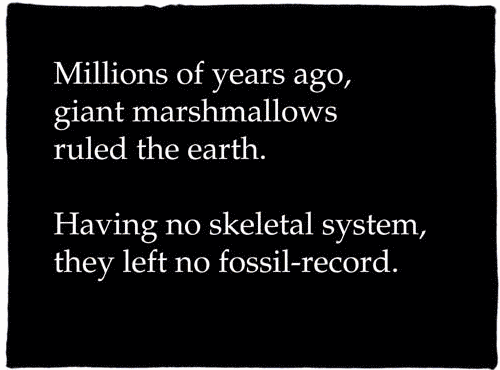What's in a name?
There’s a question I’ve been asking myself quite a bit lately. Not only do I need to come up with a name for this campaign setting, I need to name all of the locations, characters, buildings, deities, customs, landmarks, items… the list goes on and is quite daunting.
Right now my big problem is I need a name for this campaign setting so I can easily distinguish it from others when I’m talking about it in these blog posts. It’d probably also help to have a name for the material world or planet where this all takes place. Perhaps those are one in the same. Perhaps not. More on that later.
When it comes to writing, nothing makes me more self-conscious than making-up names. And on the fly? Forget it. Of course, you know this comes up all the time at the table. My players head into a tavern and want to chat up the bartender or know the name of a random governess sitting with the duke at a ball. It’s up to me to come up with something. I used to always end up with something outlandishly generic like Guinness the barkeep or something outlandishly made up like Princess Buttercake.
Chris Perkins, DM to the stars, has a genius fix for this. He pre-generates a list of names and then puts clips them on the back of his DM screen, so they’re right there whenever he needs them. If you play online through roll20.net or another service like I do you can have a Google Doc open or have one of hundreds of online name generators handy (many of them will ask for a race and a sex of a character as well which is helpful in creating an authentic name. Gorax, Eater of Worlds isn’t an awesome name for halfling jester).
Also, keep track of your names! This will be helpful not only during your current campaign, but for campaigns in the future. I keep a running list of NPCs, places, and organizations that I include in a short, weekly summary email to my PCs. These names often just have a one line description next to them, to help my players and I remember who the person is. For example:
- Moses Gomer – middle-aged, male, Cyran human who hates The Church of the Silver Flame.
By keeping track of your names, you’ll know what you’ve used in the past so you won’t re-use in the future. My mind often goes back to the same places. I love names that begin with A and end in -ar for some reason. Once you’ve gone through Andar, Alkar, Avar, etc. your mind will want to start back at the beginning. Keeping records helps you avoid the mistake of repeating a name you’ve already used. Believe me, you don’t want to have your players begin referring to NPCs as Andar I, the half-orc paladin and Andar II, the gnome necromancer.
Proper Name Creation
Lists and records are all well and good, but really don’t tell you how to come up with names. Certainly going to online name generators is one way to go. But you’ll find those names quickly repeat themselves (if anyone knows of a really good one, let us know in the comments) and you’ll be searching for a new generator and then another and then another. There’s no one great way to come up with an awesome name for a character or country or secret guild of assassins. Here’s some tricks I use to come up with cool names.
- Google translate. Often, I will take a word and translate it into another language to help me get name or inspiration. For instance, Axe is a painfully obvious name for a dwarf fighter wielding his namesake. However, according to Google Translate, axe in German is achse. Achse is a pretty cool name on its own, but if you like your translations cut with a little bit of fiction, add a nice hard consinent sound to the front and end, since dwarves are a hardy people. Pachset, Rachser, etc. are all pretty cool dwarf names. I like to use Latin for secret societies and important guilds, Romance languages for Fey races, and Germanic languages for hardy warriors, but you can use whatever you like!
- Modify existing proper names. Honestly, there’s a lot of proper names out there in fantasy already. Let’s take one that’s common – Bilbo Baggins. We have a halfling, inspired somewhat by our famed hobbit, but we don’t want to steal his name outright. Play with the name. First, let’s change one of the vowels in each to make him Bolbo Buggins. Nice, but still too close. We have a lot of Bs here, let’s replace them with an entirely different letter, like K. Kolko Kuggins. That might be far enough, but I say we take it another step and replace the Gs in his last name with Ss. So now he’s Kolko Kussins. If that’s still to close for you, add a syllable to the end of the name for good measure. Something that you see in a lot of words, like -us, -ar, -son, etc. Kolko Kussinson is unrecognizable from Bilbo Baggins.
- Fantasy names have objects and actions in their names. Solo. Skywalker. Proudfoot. Took. Give those to your character as a last name. Kixaras Firethorn is just as badass as he sounds, people! What about my old monk, Brother Feldwyr Sigma? Or the simpleton Tummas Roll? It’s simple and easy. To add a special touch of exaggeration to your names, throw a “the” in the middle of a name, like Gandalf the Grey. Tummas the Roll becomes someone else all together, don’t you think?
- Make a note and save. Sometimes a name will hit you at the strangest time. If you’ve got a mobile phone, open up that note pad app or write yourself a text or whatever and save it. I guarantee you’ll thank yourself later when you’re adding it to your master list of names. Notes on the fly are your friend. So are lists.
I’ve applied the first technique to name the world in which my campaign takes place. Since the morality of the world’s people isn’t perfectly black and white, I’ve decided the name of the world should reflect that. I’m going straight, uncut Latin on this one and calling the world Canus, which means gray in that wonderful dead language.
Title Creation
Titles are almost something else entirely. Many campaign settings have a title that describe them, which helps make them marketable. Forgotten Realms takes place on the planet of Toril. Dark Sun takes place on Athas. I want to do the same thing for Canus.
In my day job, I write a lot of marketing copy and often attend brainstorms to help think up the titles of television shows. I think the name of a world should follow a lot of copywriting rules. Keep it short, memorable, and have it reflect your central idea. You don’t want a whole phrase to be the title of your campaign setting, unless you’re getting very experimental. Good lord, the internet needs to abbreviate Forgotten Realms to FR, what would they to do A Gilded Era of Discovery and Diplomacy?
Looking back over the world, exploration and the times seem to drive a lot of what’s taking place on Canus. The time period is just as important as the place in this (or really any) setting. I want to open up the feel of adventure and excitement. Who knows what you might uncover as you delve deep in Verda or some ruins? How might you handle diplomacy in a time when everyone is both competing and dependent?
I’ve decided to call my setting Exploration Age. It evokes the Age of Discovery in our time, but exploration is a more adventurous word to me. Discovery can happen by accident. Exploration is work and adventure – it’s something one chooses to do. This is a time where folks are out there making their own names and fortunes. Let me know what you think!




